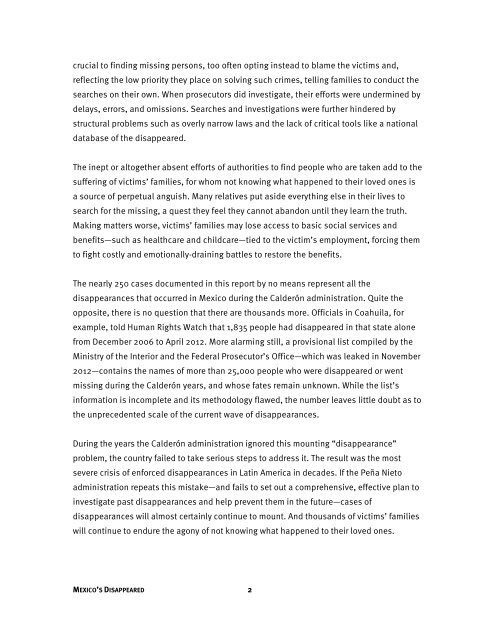Download the full report - Human Rights Watch
Download the full report - Human Rights Watch
Download the full report - Human Rights Watch
You also want an ePaper? Increase the reach of your titles
YUMPU automatically turns print PDFs into web optimized ePapers that Google loves.
crucial to finding missing persons, too often opting instead to blame <strong>the</strong> victims and,<br />
reflecting <strong>the</strong> low priority <strong>the</strong>y place on solving such crimes, telling families to conduct <strong>the</strong><br />
searches on <strong>the</strong>ir own. When prosecutors did investigate, <strong>the</strong>ir efforts were undermined by<br />
delays, errors, and omissions. Searches and investigations were fur<strong>the</strong>r hindered by<br />
structural problems such as overly narrow laws and <strong>the</strong> lack of critical tools like a national<br />
database of <strong>the</strong> disappeared.<br />
The inept or altoge<strong>the</strong>r absent efforts of authorities to find people who are taken add to <strong>the</strong><br />
suffering of victims’ families, for whom not knowing what happened to <strong>the</strong>ir loved ones is<br />
a source of perpetual anguish. Many relatives put aside everything else in <strong>the</strong>ir lives to<br />
search for <strong>the</strong> missing, a quest <strong>the</strong>y feel <strong>the</strong>y cannot abandon until <strong>the</strong>y learn <strong>the</strong> truth.<br />
Making matters worse, victims’ families may lose access to basic social services and<br />
benefits—such as healthcare and childcare—tied to <strong>the</strong> victim’s employment, forcing <strong>the</strong>m<br />
to fight costly and emotionally-draining battles to restore <strong>the</strong> benefits.<br />
The nearly 250 cases documented in this <strong>report</strong> by no means represent all <strong>the</strong><br />
disappearances that occurred in Mexico during <strong>the</strong> Calderón administration. Quite <strong>the</strong><br />
opposite, <strong>the</strong>re is no question that <strong>the</strong>re are thousands more. Officials in Coahuila, for<br />
example, told <strong>Human</strong> <strong>Rights</strong> <strong>Watch</strong> that 1,835 people had disappeared in that state alone<br />
from December 2006 to April 2012. More alarming still, a provisional list compiled by <strong>the</strong><br />
Ministry of <strong>the</strong> Interior and <strong>the</strong> Federal Prosecutor’s Office—which was leaked in November<br />
2012—contains <strong>the</strong> names of more than 25,000 people who were disappeared or went<br />
missing during <strong>the</strong> Calderón years, and whose fates remain unknown. While <strong>the</strong> list’s<br />
information is incomplete and its methodology flawed, <strong>the</strong> number leaves little doubt as to<br />
<strong>the</strong> unprecedented scale of <strong>the</strong> current wave of disappearances.<br />
During <strong>the</strong> years <strong>the</strong> Calderón administration ignored this mounting “disappearance”<br />
problem, <strong>the</strong> country failed to take serious steps to address it. The result was <strong>the</strong> most<br />
severe crisis of enforced disappearances in Latin America in decades. If <strong>the</strong> Peña Nieto<br />
administration repeats this mistake—and fails to set out a comprehensive, effective plan to<br />
investigate past disappearances and help prevent <strong>the</strong>m in <strong>the</strong> future—cases of<br />
disappearances will almost certainly continue to mount. And thousands of victims’ families<br />
will continue to endure <strong>the</strong> agony of not knowing what happened to <strong>the</strong>ir loved ones.<br />
MEXICO’S DISAPPEARED 2

















